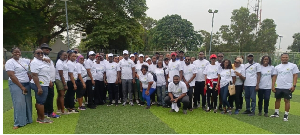Domestic carriers in the country have fingered the Ghana Airports Company Limited (GACL) for the imposition of arbitrary levies without any due consultation with them.
The Chief Operating Officer (COO) of Africa World Airlines, Mr. Apiigy Afenu, told the B&FT that such arbitrary levies eventually raise the cost of operations of local carriers.
“The GACL does things without recourse to us. They don’t understand that they are there to support us. They are loading costs to the industry, and it is all because there is a lack of coordination of policy in the aviation sector,” he said.
The GACL in recent times required of domestic operators to increase the insurance policy on their vehicles operating on the tarmac from US$500,000 to US$1million, a move that incensed some local operators. There are also the taxes paid on spare parts imported by domestic airlines, while foreign carriers enjoy tax-free importation.
“There is a lot that government can do to support the industry. Spare parts were exempted from import duty, but recently we realised that they have started charging import duty, Value Added Tax (VAT) and National Health Insurance Levy (NHIL),” Mr. Apiigy said.
Domestic aviation has seen a boost in the last half-decade, with the number of licencees growing from two to five. Starbow, Africa World Airlines and 540 are among the recent entrants into the industry. Antrak and CityLink have held their licences for more than a decade. The latter however has suspended its services because of operational challenges.
The operators fly to the four major domestic airports in the country—Kumasi, Sunyani, Tamale and Takoradi—from Accra.
Poor aviation infrastructure, especially the lack of runway lights at the regional airports, has meant that domestic carriers must schedule their flights between 6am and 5pm local time every day.
Limited space at the terminal buildings in Kotoka International Airport (KIA) and the four regional airports is also among the concerns of the industry.
“We [domestic operators] have enough in common for us to come together as a group and go make presentations to government. There is enough in this market alone to make all of us viable,” Mr. Afenu said.
“There should be a trade body representing us to articulate our issues. But what I don’t agree with is bad-mouthing government. Governments everywhere are the largest buyers of goods and services,” he added.
Business News of Monday, 21 October 2013
Source: B&FT













